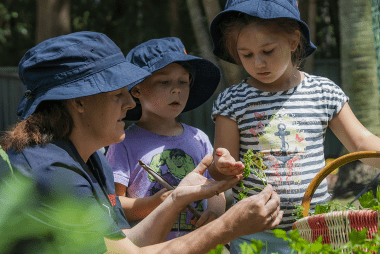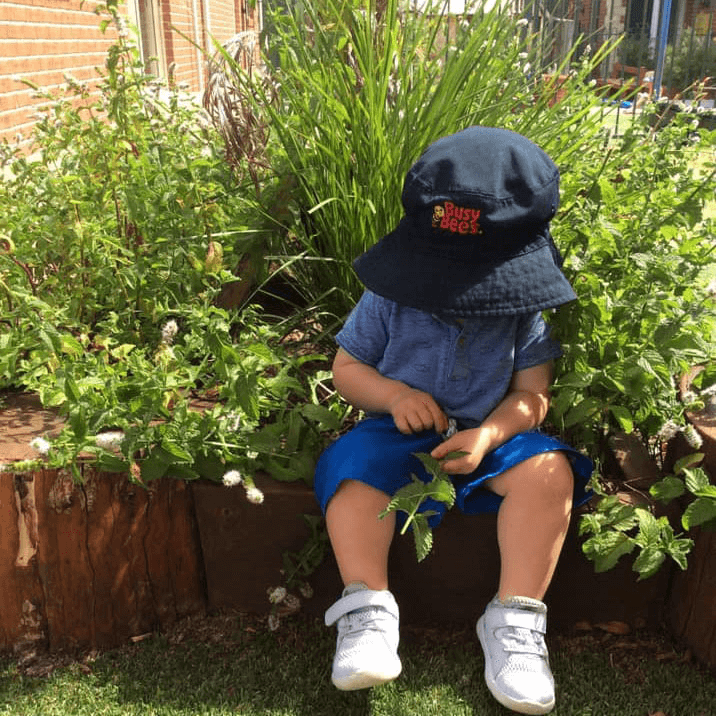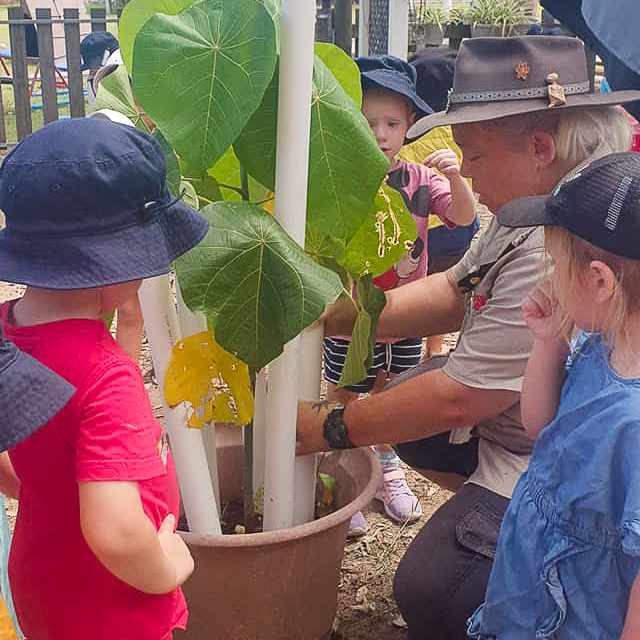
Photo: Follyfoot Farm by Busy Bees
Caring for our planet starts early! As a five-year-old in Ireland reportedly explained to an International research group, sustainability means “to save the world for later” (OMEP Congress, Sweden, 2010).
So, what are sustainable practices in childcare? Sustainable practices involve making thoughtful, eco-friendly choices, such as recycling, saving energy, and using natural resources, that help protect the planet.
More importantly, it teaches children to value and care for their environment, nurturing a sense of responsibility and respect for the world around them.
At Busy Bees we explore fun and simple ways to bring eco-friendly habits into everyday play and learning. From saving water to exploring nature, discover how to teach little ones to love and care for the world around them.
Why Sustainability Practices Matter in Early Childhood Settings
Helping children develop a love for the environment starts with simple, hands-on experiences that spark their curiosity. By making sustainability part of everyday life, children learn that small actions add up to a big difference. Their natural sense of wonder turns into a sense of responsibility, shaping habits that will stay with them as they grow.
This is where the guidance of educators becomes key. As part of Quality Area 3 of the National Quality Standards, educating and supporting children to become environmentally responsible is an important part of early childhood. Achieving sustainable development is a fundamental goal that integrates environmental, social, and economic dimensions.
Long-Term Educational Value
Conserving resources is crucial within the broader sustainability framework as it helps reduce consumption and waste. A sustainable early learning service will not only include environmental education within their curriculum and learning programs but will also role model sustainable practices within their daily operations. This may include developing sustainable policies around energy usage, water consumption, food waste and engagement with the local community.

Photo: Busy Bees at Warwick
Teaching Sustainability Practices in Childhood Settings
It’s never too early to teach children about the environment. Early childhood education plays a crucial role in laying the foundations for lifelong learning and integrating sustainability into educational practices.
Children of all ages benefit from forming connection with nature. As these connections and experience the great outdoors. Time spent in nature allows children to form connections with the environment as well as learning their place within the world and their ability to influence things. As these connections with nature form, so to does children’s growing environmental awareness. Whilst these connections may seem small, collectively, they have a significant impact on reducing our environmental footprint.
Four simple ways to teach sustainable practices to children include:
1. Education and Awareness: Read books and sing songs with eco-themes
Reading storybooks with your child is both an opportunity to bond with them and an excellent way to introduce difficult topics such as recycling and waste reduction in a child-friendly way. ABC Kids recommends some well-known classics such as Where the Wild Things Are and Charlotte’s Web to start the conversation about the importance of living sustainably.
2. Discuss sustainability at home
Families play a key role in sustainability education. Engage your child in discussions about being sustainable at home, such as noticing how the rubbish bin is full, or how many food scraps are left over after dinner, or when the tap hasn’t been turned off correctly. Discuss what can be done to reduce waste, such as recycling rubbish, freezing leftovers or composting food scraps. You may even like to start a worm farm or compost bin at home or involve your child in sorting through rubbish together to see what can be recycled or re-purposed. For pre-schoolers, having a responsibility or job to do can help scaffold their growing independence while also forming sustainable habits. Encouraging children to be energy-conscious by turning off unnecessary lights and appliances is another effective strategy. These simple practices not only reduce energy consumption but also instills a sense of environmental responsibility from a young age. Give your child the job of being the “energy saver” in the house, responsible for noticing lights, fans and other appliances left on when not in use.
3. Encourage outdoor learning and nature-based play
When was the last time you went outdoors as a family? Going on bushwalks, visiting the beach, or simply enjoying nature in your own neighbourhood is not always possible for some families.
As daycare educators, we adopt a natural play environment to learn about animals, explore leaves and insects, and encourage children to notice the world around them.
Using natural materials, we create learning spaces that show an appreciation for the natural world. It supports sensory exploration, allowing children to engage their senses through textures and smells. You could even bring a bag to collect some rubbish on your walk and discuss how it’s important to keep our environment clean.
Using natural materials and encouraging outdoor exploration creates sustainable learning spaces that foster an appreciation for the natural world. It also supports sensory exploration, allowing children to engage their senses through textures and smells. Imagine children feeling the roughness of bark, smelling fresh flowers, and listening to the rustling of leaves. These sensory experiences foster a deep connection to the natural world and enhance children’s understanding of their environment.
4. Engage in age-appropriate activities: veggie gardens or composting
Imagine children planting seeds, watering plants, and watching their efforts blossom into fresh vegetables and fruits. This opens up so many potential conversations around food production and reducing waste. How long do you think this zucchini will take to grow big enough to eat? What would happen if there were not enough rain to water the garden?
These activities not only teach children about gardening but also foster a sense of responsibility and care for the environment. Using compost bins to transform organic waste into valuable compost for gardens engages children in sustainability practices. They learn to differentiate between compostable and non-compostable materials, gaining a practical understanding of waste management.

Photo: the children at Busy Bees at Fraser Coast build a frog hotel
Busy Bees Commitment to Sustainable practices
At Busy Bees, we are committed to protecting our environment to ensure a sustainable future for our children. We do this in a number of ways within our Services and Head Office, such as using electronic communications to limit paper waste, incorporating recycled and second-hand materials in children’s play, reducing water wastage where possible, and regularly reviewing our policies and procedures to ensure more sustainable outcomes.
Our employees, children and families work together to protect our environment as we educate children about the importance of being environmentally responsible within our everyday practice.
In our educational programs and conversations with children, Busy Bees Educators support children in learning to care for the environment by:
- Including sustainability and environmentally responsible practices as part of the curriculum, and in discussions with children and families
- Providing information to families on environmentally responsible practices that are implemented at the Service and encouraging these practices at home
- Making recycling part of everyday practice at the Service – Recyclable containers will be provided throughout mealtimes and in learning experiences
- Sharing ideas between Educators, children, and families about environmentally responsible ideas, implementation, and resources. This will be supported through our communication strategies, including parent meetings, emails, newsletters, and informal conversations.
- Role modelling energy and water conservation practices: For example, turning off lights and air-conditioning when a room is not in use, emptying water play containers onto garden areas.
- Embedding the concept of ‘reduce, re-use and recycle’ in everyday practice for both children and Educators to build lifelong attitudes towards environmentally responsible practices
- Purchasing equipment that is environmentally friendly where possible. Educators will reduce the amount of plastic and disposable equipment they purchase and select materials that are made of natural materials.
- Using worm farms and/or compost bins to reduce food waste in the Service. Children will be encouraged to place food scraps into separate containers for use in the worm farm or composting bin. Educators will provide visual guides and discuss with the children and families which scraps worms can eat, which foods can be composted, and which food scraps must go in the bin. The children will be involved in maintaining the worm farm and compost bin.
- Using ‘green cleaning’ products to replace chemicals where possible
Each Busy Bees Service has created their own Busy Bees Environmental Commitment Statement to ensure that as a whole, Busy Bees is working toward providing an environment that is cleaner and healthier for all our stakeholders while supporting sustainability. To find out more about how Busy Bees supports the environment, contact your nearest Service.
